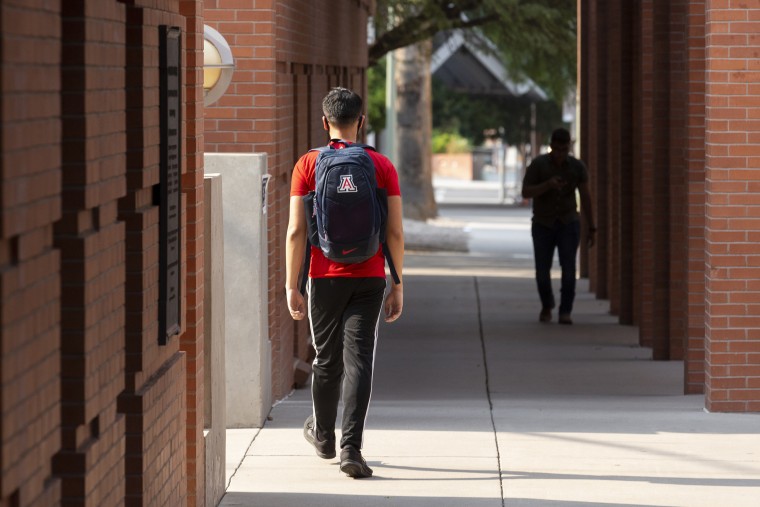Voters in Arizona have approved a ballot initiative to extend in-state college tuition to qualifying students regardless of immigration status, The Associated Press has reported.
Proposition 308 will allow students, including those who are undocumented, to pay in-state college rates if they've attended Arizona high schools for at least two years.
More than 3,600 undocumented Arizona students could benefit from the measure annually, according to research by the American Immigration Council, a nonprofit immigrant advocacy group based in Washington, D.C.
Hazel Villatoro, 17, is originally from Chiapas, Mexico. She has been living in Arizona virtually her whole life — since she was a 1 year old. After graduating from high school in three years, she wanted to attend Arizona State University, but she said she would have had to pay three times more to attend than her sister, who pays in-state tuition because she's a legal resident.
“I’m not asking for anybody to pay for my tuition. I just want a fair opportunity as my fellow Arizona students,” said Villatoro, a freshman attending Grand Canyon University on a full-ride private scholarship and majoring in biology to become an anesthesiologist.
“I just want to give back to the community and pursue the career that I want,” Villatoro said.
Hundreds of college students who don't have legal status are paying a non-resident rate that is 150% more than in-state costs, according to the AP.
In-state tuition access could help increase undocumented students' earnings and spending power by tens of millions of dollars annually, as they would go on to obtain college degrees, according to the American Immigration Council, which could also help raise an additional $4.9 million per year in federal income taxes and state and local taxes.
Proposition 308 will also make qualifying students eligible to qualify for state-funded aid, including scholarships and grants.
While Arizona voters saw many ads slamming border and immigration issues, Proposition 308 was “actually the first pro-immigrant ballot measure before voters," said Rebecca Shi, director at the American Business Immigration Coalition, a national immigrant rights advocacy group. "A significant number of independents and Republicans chose humane and economically beneficial solutions over fear and division.”
The proposition received bipartisan support, from Democratic Sens. Mark Kelly and Kyrsten Sinema to Republicans like state House Speaker Rusty Bowers and former Republican gubernatorial candidate Karrin Taylor Robson.
The victory comes after a two-year investment, including nearly $6 million on the Yes on 308 campaign that included TV and digital ads, knocking on 3.8 million doors, 3.3 million text message and phone attempts and a total of 1 million completed voter contacts, according to the campaign.
“It’s showing that people are starting to listen, understand it a little bit better, and we’re doing a better job of helping create a better narrative for our community,” said David Adame, president and CEO at Chicanos Por La Causa, a civic and social justice organization formed in 1969 to fight discrimination against the Mexican American community.
The outcome signals a stark contrast and shift from Arizona's 2006 Proposition 300, which prohibited undocumented people from receiving in-state tuition and state financial assistance. More than 71% of Arizona voters at the time voted in favor of the proposition.
"We weren't asking for a subsidy, any special favors or any shortcuts. These young high school graduates from Arizona still have to earn their way to get accepted in university," Adame said.
Follow NBC Latino on Facebook, Twitter and Instagram.

